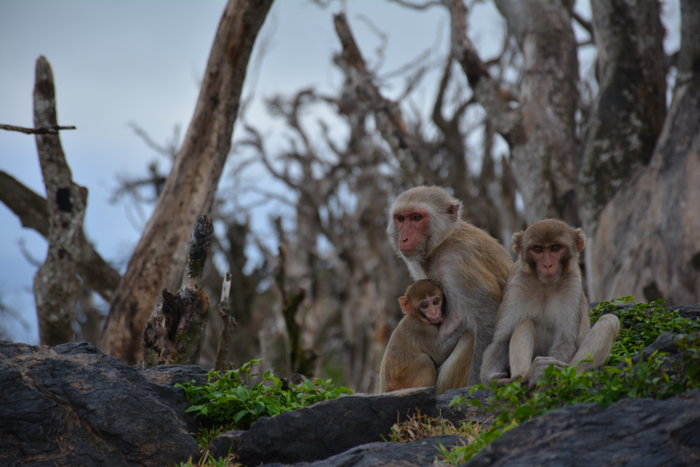Survivors of extreme weather events may experience accelerated ageing, new study suggests
Biological ageing signs found to be faster in rhesus macaques that survived Hurricane Maria

Your support helps us to tell the story
From reproductive rights to climate change to Big Tech, The Independent is on the ground when the story is developing. Whether it's investigating the financials of Elon Musk's pro-Trump PAC or producing our latest documentary, 'The A Word', which shines a light on the American women fighting for reproductive rights, we know how important it is to parse out the facts from the messaging.
At such a critical moment in US history, we need reporters on the ground. Your donation allows us to keep sending journalists to speak to both sides of the story.
The Independent is trusted by Americans across the entire political spectrum. And unlike many other quality news outlets, we choose not to lock Americans out of our reporting and analysis with paywalls. We believe quality journalism should be available to everyone, paid for by those who can afford it.
Your support makes all the difference.Extreme weather events could possibly increase ageing in human populations, suggested a new study which analysed monkeys that survived Hurricane Maria.
Biological signs of ageing were faster in the macaques that survived the hurricane compared to those that did not experience the disaster, according to the research published Monday in the journal PNAS.
Macaques exposed to the hurricane seemingly aged by an average of nearly two years, corresponding to 7-8 years of human life, suggesting that an increase in such adverse weather events linked to the climate crisis may lead to adverse biological consequences for those who experience them.
Hurricane Maria was a category-4 storm which struck Puerto Rico in September 2017, killing over 3,000 people and knocking out the power supply for the island’s 3.4 million residents for several weeks.
The hurricane caused more than $100bn (£73bn) in damages.
Along with the human toll, the hurricane also impacted the island’s wildlife, including a group of free-ranging rhesus macaques living on the isolated Cayo Santiago island near Puerto Rico.
In the new study, scientists assessed surviving macaque individuals living on the island’s Caribbean Primate Research Centre since 1938, and found the hurricane may have accelerated ageing in the monkeys’ immune systems.
They analysed four years of data on the monkeys collected prior to Hurricane Maria and a year after the natural disaster.
While previous studies have established that people surviving extremely adverse experiences face greater risks of developing heart ailments and other diseases common in older individuals, researchers said it remains unknown how these detrimental experiences promote disease.
People of the same chronological age – with the same number of years since birth – can differ in their biological age which determines when and how they develop such diseases.
In the research, scientists analysed markers of biological ageing in the surviving macaques, including molecular changes as well as disruptions of genes involved in inflammation and those which help proteins fold into their proper functional shapes.
Analysing the functioning of genes in the macaque immune cells, they found that the hurricane adversity may have accelerated ageing of the monkeys’ immune systems.
Researchers said about 4 per cent of the genes expressed in immune cells were altered following the hurricane.
Genes that had higher expression after the hurricane were involved in inflammation, while genes dampened by the extreme weather event were those involved in the body’s natural protein production, structure modification processes and adaptive immune response, the study noted.
“On average, monkeys who lived through the Hurricane had immune gene expression profiles that had aged 2 extra years, or approximately 7-8 years of human lifespan,” Marina Watowich, the study’s lead author from the University of Washington, said in a statement.
Researchers said one critical mechanism, involving gene regulation in the cells of the immune system, could explain how adversity related to extreme weather events and other natural disasters may “get under the skin” to drive age-associated disease.
“Our findings suggest that differences in immune cell gene expression in individuals exposed to an extreme natural disaster were in many ways similar to the effects of the natural ageing process,” Noah Snyder-Mackler, another study co-author, said.
“We also observed evidence for accelerated biological ageing in samples collected after animals experienced Hurricane Maria,” Dr Snyder-Mackler added.
Scientists also found that some monkeys’ biological ages increased much more than others, indicating that other aspects of the monkey’s environment may also influence their response to adversity.
They said monkeys with greater social support after the storm were better able to overcome any detrimental effects.
Citing a limitation of the study, the researchers noted that they could not measure ageing rates within the same macaque individuals before or after the hurricane.
In the future, they hope to conduct longer-term studies of each individual within a population to learn more about the intersection between biological ageing, adversity and social structures in the face of natural disasters.
“Together, our findings suggest that experiencing an extreme hurricane is associated with alterations in immune cell gene regulation similar to ageing, potentially accelerating aspects of the ageing process,” the scientists concluded.
Join our commenting forum
Join thought-provoking conversations, follow other Independent readers and see their replies
Comments